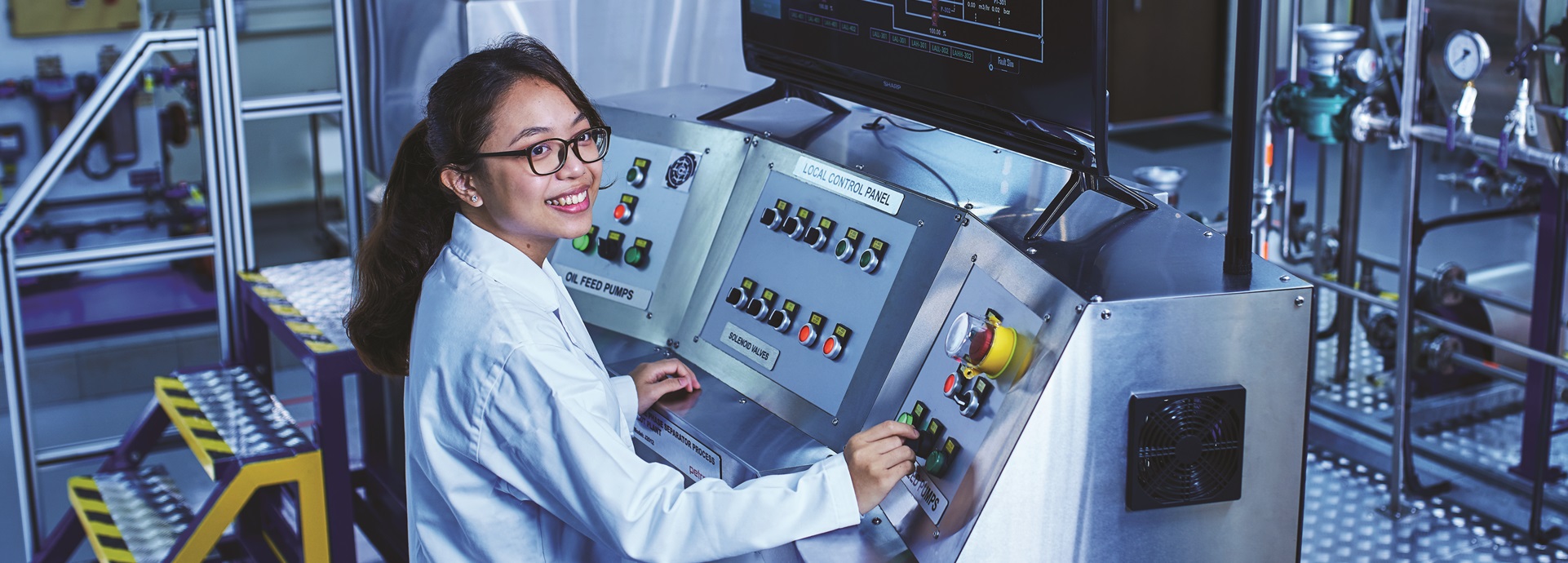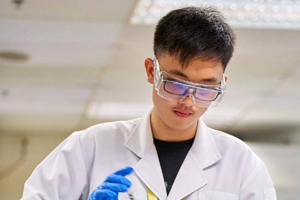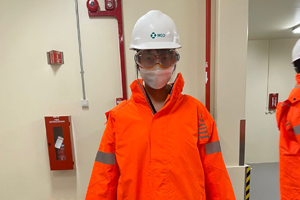Why CBE?
- Step into dynamic careers in industries driving the future — from biopharmaceuticals and petrochemicals to semiconductors, energy, and sustainability
- Experience immersive learning with our modular pilot plant, where you take control of system operations, complemented by simulation tools and digital twin technology
- Gain real-world learning experience through internships, industry mentorships and capstone projects with MNCs such as GSK, Lonza, Pfizer, ExxonMobil, Shell, Merck, Air Liquide and Siemens
About CBE
A broad-based course that integrates biological and chemical sciences with engineering concepts, the Diploma in Chemical & Biomolecular Engineering (CBE) prepares you for careers in diverse industries, including energy, chemical, biopharmaceuticals, biotechnology, environment, semiconductors, and manufacturing.
CBE covers essential concepts in chemical engineering through modules such as Chemical & Biomolecular Engineering Principles, Inorganic & Physical Chemistry, Organic & Biological Chemistry, and Thermodynamics.
You’ll explore the application of scientific concepts in operating engineering systems and equipment. This includes in-depth study of biopharmaceutical technology, chemical engineering transfer technologies, analytical chemistry, as well as the role of the chemical engineer in addressing environmental pollution.
The course enhances critical thinking and problem-solving skills that are crucial for future chemical and biomolecular engineers. Sustainability concepts are integrated into the curriculum, equipping you to develop solutions for real-world challenges. You will also gain skills in data analytics, simulation software, and process optimisation through hands-on experiences with automated pilot plants and simulated refineries in IT-enabled facilities. These skills will prepare you for careers in the dynamic biopharmaceutical and semiconductor manufacturing industries.
In your final year, choose from two tracks that will get you ready for exciting high-growth industries:
- Sustainable Energy & Chemistry: This track focuses on skills in chemical engineering and environmental management. Your capstone project – supervised by industry professionals – will give you insights into sustainable energy production and green chemistry.
- Biopharmaceutical: Explore modules that delve into biopharmaceutical processes such as cell culture and the purification of biological products. Gain expertise in biopharmaceutical manufacturing, process optimisation, and quality control to prepare you for careers with global biopharmaceutical manufacturing companies.
Benefit from our strong industry connections with modules that are co-developed and co-delivered with leading partners such as Air Liquide. Learn from experts through lab work, projects and internships, and stay updated on sustainable industry practices,
process design, and biopharmaceutical analysis.
You can also gain hands-on learning through experiences co-developed and co-delivered with our industry experts from Merck. Visit M LabTM Collaboration Center, where you will learn directly
from Merck professionals and gain access to cutting-edge facilities and real-world insights into biopharmaceutical manufacturing.
In your final year, apply your skills by choosing either of these options
- Industry Internship: Work with companies such as Air Liquide, Merck, ExxonMobil, Evonik, GSK, Pfizer, Lonza and Siemens.
- Research Internship: Conduct research at local facilities such as A*STAR, or an overseas research institution
Overview of Your CBE Journey
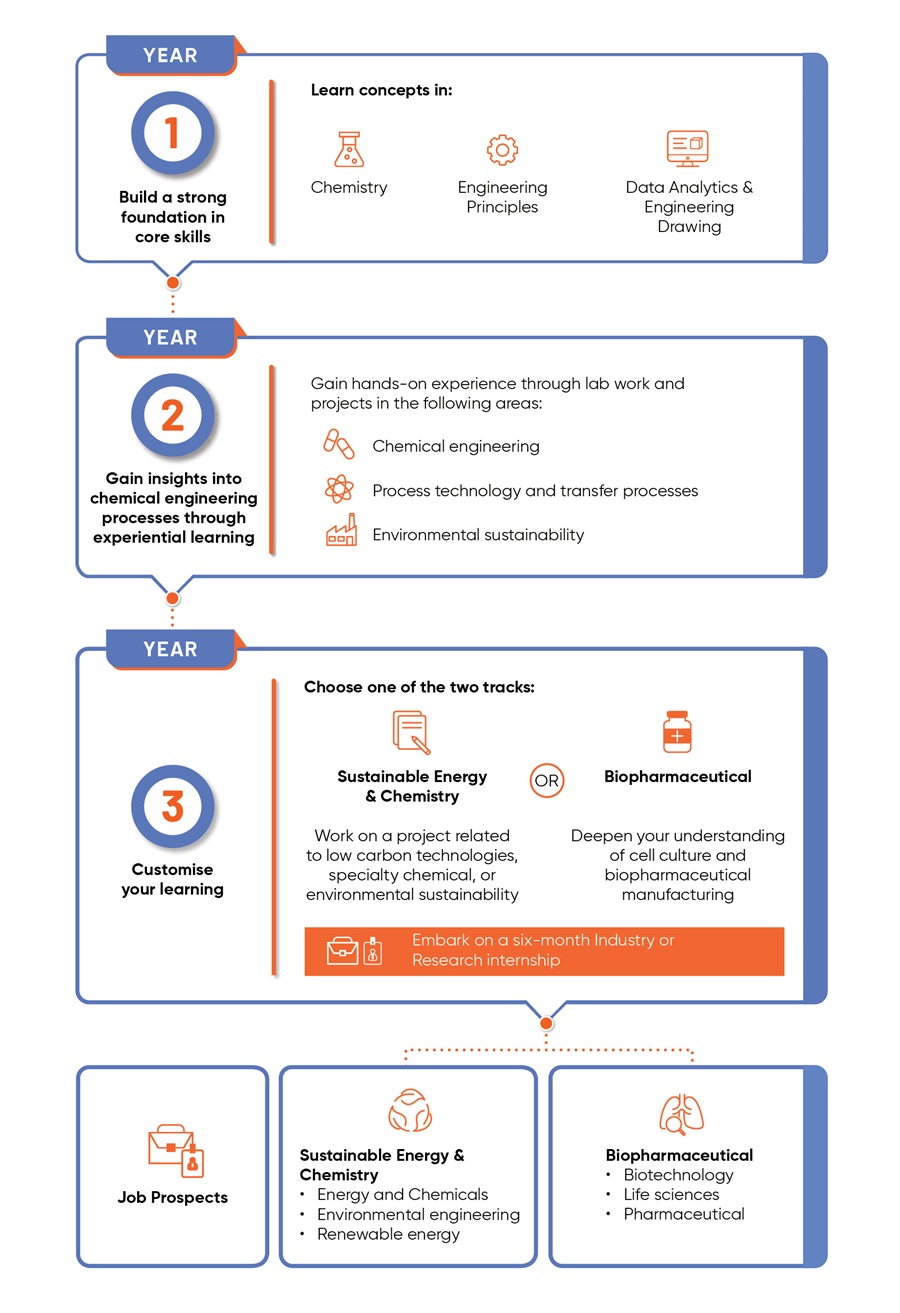
Highlights
Empowering Future-Ready Graduates in partnership with Siemens SG
Ngee Ann Polytechnic is proud to partner Siemens to strengthen the industry relevance of our students from the Diploma in Chemical & Biomolecular Engineering. Through this collaboration, learners will gain access to hands-on training, industry-led projects and real-world technologies such as process control and automation – equipping them for the future of work in fast-evolving sectors.
Read more about it at: Empowering Future-Ready Graduates with Ngee Ann Polytechnic - Siemens SG
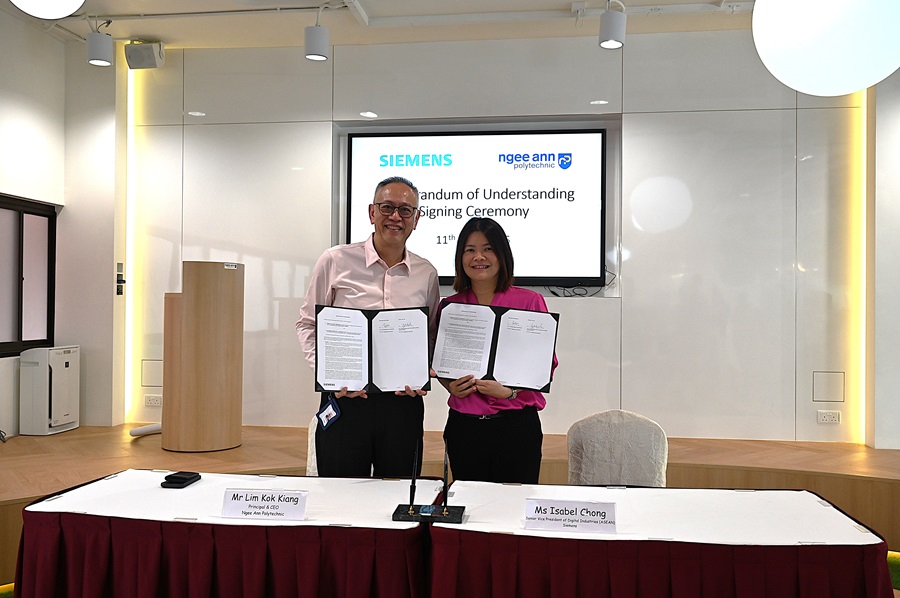
Further Studies
You can pursue a wide range of degrees offered by local universities. These include degree courses in chemical and biomolecular engineering, chemical engineering, environmental engineering, material sciences, physics, chemistry and biological sciences at National University of Singapore, Nanyang Technological University, and Singapore Institute of Technology.
You may enjoy module exemptions when you apply for related degree programmes at overseas universities, including:
Australia
- The University of Adelaide
- The University of Melbourne
- The University of Queensland
- The University of Western Australia
- University of New South Wales
United Kingdom
- Imperial College
- Newcastle University
- The University of Manchester
Industry Partners
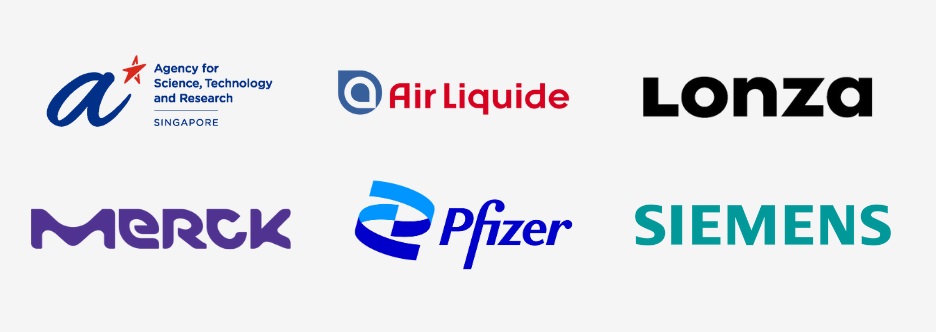
Careers
The CBE course provides you with a strong foundation and the flexibility to enter a wide range of industries, including:
- Chemical and Petrochemical
- Biochemical and Biotechnology
- Biomedical and Pharmaceutical
- Food & Beverage
- Electronics
- Environment, Health & Safety
You can look forward to rewarding career options such as:
- Assistant Biotechnologist
- Laboratory Technician/Technologist/Analyst
- Process Technician
- Quality Assurance Assistant
- Quality Control Assistant
Entry Requirements
AGGREGATE TYPE ELR2B2-C
To be eligible for consideration, candidates must have the following GCE ‘O’ Level examination (or equivalent) results.
| Subject | 'O' Level Grade |
|---|---|
| English Language | 1-7 |
| Additional Mathematics/Mathematics | 1-6 |
| Any one of following subjects: Biology Biotechnology Chemistry Computing/Computer Studies Design & Technology Electronics/Fundamentals of Electronics Physics Science (Chemistry, Biology) Science (Physics, Biology) Science (Physics, Chemistry) | 1-6 |
Applicants must also fulfil the aggregate computation requirements for the ELR2B2-C Aggregate Type ( English Language, 2 relevant subjects and 2 other best subjects) listed at www.np.edu.sg/docs/ELR2B2.pdf.
For students with other qualifications, please refer to the NP website for the entry requirements and admissions exercise period.
What You Will Learn
Chemical & Biomolecular Engineering Principles (3 Credit Units)
The module introduces students to basic chemical and biomolecular engineering concepts and applications, for example, units and dimensions, material balance calculations, reaction stoichiometry, reaction engineering, fluid mechanics, and fundamental concepts in biology. Upon completion of this module, students will be able to undertake basic chemical and biomolecular engineering calculations.
Data Analytics and Engineering Drawing (3 Credit Units)
The module introduces basic data analytics which includes data processing as well as data visualization. Students will be trained in identifying the proper form of data representation in technical communication. In addition, the module also provides hands-on practice of AutoCAD in engineering drafting to allow students to appreciate the use of computer software in the engineering field.
Engineering Mathematics 1 (6 Credit Units)
The module provides students with adequate foundation of Engineering Mathematics that will enable them to acquire specialist mathematical skills for their career and/or further studies. Students will also use a mathematical software package to solve mathematical problems.
Inorganic & Physical Chemistry (4 Credit Units)
The module introduces the basic principles of inorganic and physical chemistry and relevant laboratory techniques for the students. After completion of the module, students will have sufficient knowledge in inorganic and physical chemistry concepts as an important foundation for other subjects in subsequent years in the Chemical and Biomolecular Engineering diploma course.
English Language Express* (Credit Units - NA)
English Language Express aims to give you a better grounding in the English Language and to strengthen the written and oral communications skills that you will need in your academic and professional careers. You will be engaged in writing, reading, listening and speaking activities that will develop your ability to speak and write grammatically, coherently and clearly. You will also hone your reading and listening comprehension skills.
Innovation Made Possible^ (3 Credit Units)
Career & Professional Preparation 1 (1 Credit Units)
This module is part of the Education and Career Guidance framework to provide students with the tools and resources necessary for their career and/or further education. In this first module, students will undergo personal discovery and exploration of
industry and career prospects. Students will learn how to plan and set achievable goals in preparation for their future. Students will also learn the importance of passion and professionalism, along with basic teamwork and interpersonal skills.
Engineering Mathematics 2 (4 Credit Units)
The module provides students with adequate foundation of Engineering Mathematics that will enable them to acquire specialist mathematical skills for their career and/or further studies. Students will also use a mathematical software package to solve mathematical
problems.
Organic & Biological Chemistry (4 Credit Units)
The module introduces the basic principles of organic chemistry and relevant laboratory techniques for the students. These include classification and reactivity of functional groups, nomenclature system, polymerization process, and isomerism. The module also discussed important biological molecules, such as carbohydrates, lipids, proteins, and enzymes, from the perspectives of their chemical structures.
Thermodynamics (5 Credit Units)
In this module, students will study the fundamental concepts of thermodynamics and fluid mechanics. Topics include the first and second laws of thermodynamics, properties of liquids and vapours, non-flow processes and steady flow processes with steam and perfect gases. The concepts of pressure, pressure head, and pressure measurement will also be discussed.
Confident Communication: Find Your Voice (VOICE)^ (3 Credit Units)
The VOICE module aims to empower students to become thoughtful and confident communicators able to tailor a message to suit audience, purpose and context. Students will learn how to use storytelling structures and techniques, persuasive strategies and effective visuals to connect meaningfully with their audience. Through a personalised growth plan, the module encourages students to reflect, set goals and take ownership of their growth and development as communicators. The module employs engaging teaching strategies such as games, thinking routines, masterclasses and workshops, and a celebratory showcase festival at the end to make learning fun and exciting.
Health & Wellness (1 Credit Unit)
This is a Level 1 Core module for all Year 1 students. The module will introduce students to the importance of maintaining both physical and mental health through the knowledge and monitoring
of health indicators, and application through appropriate exercises. The aim of the module is to empower students with basic knowledge and skills to be independent and responsible in maintaining overall personal health.
Analytical Chemistry (3 Credit Units)
This module teaches students some common separation and characterisation instruments and instrumental techniques used in the laboratory and provides hands-on learning opportunities. These techniques include UV-visible spectrophotometry (UV-Vis), gas liquid chromatography (GLC), high performance liquid chromatography (HPLC) and Atomic Absorption Spectroscopy (AAS).
Career & Professional Preparation 2 (2 Credit Units)
This module is part of the Education and Career Guidance framework to provide students with the tools and resources necessary for their further career and/or education. In this module, students will explore basic job search strategies, practice writing effective resumes and cover letters, and learn interview skills. Students will also learn professional and intercultural communication skills to prepare them for a dynamic and diverse workplace.
Chemical & Biological Reaction Engineering (5 Credit Units)
This module is designed to provide students with basic skills in chemical and biological reactor operations and design, combining and building upon knowledge of chemistry and mathematics gained in the first year of the Chemical and Biomolecular Engineering diploma course. Reaction engineering is one of the major skills, which distinguishes chemical engineering from other engineering disciplines. Students will also learn the biological reaction such as fermentation and continuous bioprocessing.
Reaction and Flow Laboratory (3 Credit Units)
The module provides students with the opportunity to operate common chemical engineering equipment used in reaction engineering and fluid flow. These include the use of batch and continuous reactors, pumps, compressor, and friction measurement. Students will also practice the process of experiment designs and project management through a lab based learning approach.
Sustainable Industry Practices (4 Credit Units)
This module provides students with a comprehensive understanding of sustainable practices and their application in various industries. The module focuses on the importance of sustainability in the industrial sector and explores strategies for implementing sustainable practices effectively. They will also learn about green engineering and chemistry and be able to appraise how these concepts are implemented in sustainable energy and industry processes.
Transfer Processes – Fluid Flow (3 Credit Units)
In this module, students are introduced to fluid dynamics. Topics include energies of liquids in motion, flow in pipes, general principles of pumps and system characteristics compressors, and flow measurement.
Analysis of Chemical Engineering Processes (5 Credit Units)
The module aims to provide fundamental principles of process flow diagram analysis, including both material and energy balances for single and multiple process units. Students will also acquire familiarity with data-sources, charts, handbooks and/or literature used in process flow diagram analysis.
Environment, Health, and Safety (4 Credit Units)
The module covers the role of the chemical engineer in solving and preventing environmental problems especially in the areas of air and water pollution. Students will explore common methods and processes that help to reduce or control pollution in the chemical industry. In addition, the module provides students with sufficient knowledge of occupational, health and safety knowledge and practices in the workplace, including the statutory requirements for good and safe work practices.
Process Technology Operations (3 Credit Units)
The module introduces practical aspects of controls, sensors, and instrumentation. It aims to equip students with a basic knowledge of how automated control systems are implemented in process control plants. Fundamental concepts of Process Quality Control as well as digital monitoring and simulation are also covered in the context of an integrated chemical system.
Transfer Process and Environmental Laboratory (3 Credit Units)
The module aims to complement students’ understanding of chemical engineering equipment in the field of heat and mass transfer, and environmental technology through the completion of relevant experiments. Students will also practice the process of experiment designs and project management through a lab based learning approach in water analysis.
Transfer Processes - Heat and Mass (3 Credit Units)
This module covers the basic principles of heat and mass transfer in chemical processes and equipment, including heat exchangers, cooling towers, packed and fluidised beds, etc. The key concepts in the module also allow students to have a deeper understanding of advanced unit of operations in chemical engineering such as evaporation and condensation, distillation, extraction, filtration, and other separation techniques.
World Issues: A Singapore Perspective^ (2 Credit Units)
Process and Automation Laboratory (3 Credit Units)
The module provides students with the opportunity to apply their knowledge on transfer processes and unit operations in chemical & pharmaceutical engineering through hands-on experiences with both standalone units and an integrated chemical system. Students will also learn the concept of start-up, shutdown and troubleshooting through the use of a simulation software.
Separation Technology (4 Credit Units)
This module provides the students with scope of unit operations in chemical engineering. Topics include evaporation, adsorption, distillation, liquid-liquid extraction, absorption, membrane separation processes and crystallization.
Sustainable Process Design (4 Credit Units)
This module aims to provide students with an understanding of the principles and methodologies involved in designing sustainable processes in the chemical process plant with the aid of AutoCAD and commercial computational software. The module emphasizes the importance of integrating environmental, social and economic considerations into the process design phase.
Sustainable Energy & Chemistry track
Capstone Project (8 Credit Units)
This module provides an opportunity for students to apply their knowledge and skills to solve real-world industry challenges. It helps students to develop essential skills and foster collaboration. Students work on a project in collaboration with industry partners, aiming to deliver practical solutions and recommendations.
Biopharmaceutical track
Biopharmaceutical Manufacturing (4 Credit Units)
This module focuses on principles and practices in the manufacturing of biological agents such as vaccines, biologic drugs and antibodies by mammalian and microbial catalysts. It further provides students with a working knowledge of important aspects in the upstream and downstream manufacturing processes of biologics products. Topics include an overview of kinetic and stoichiometric analysis of bioreactors, biomanufacturing process operations, bioreactor design principles, single use systems, agitation and mixing, heat transfer and temperature culture, and process scale-up.
Biopharmaceutical Analysis (4 Credit Units)
This module is designed to equip students with knowledge and molecular techniques that are used to analyse raw materials and biological products. Topics include an overview on regulatory requirements and guidelines, process and method validation, SOPs, root cause analysis and corrective and preventative actions, ICH Guidelines, specifications and critical quality attributes, physicochemical and immunochemical characterization of biopharmaceuticals, detection of adventitious agents in biological products using pyrogen testing, environmental monitoring, bioburden test.
Project ID: Connecting The Dots^ (4 Credit Units)
Industry Track (20 Credit Units)
Industrial Internship
Students will do an internship and project which gives them opportunities to apply the knowledge acquired in classrooms to real-world work situations. They will be attached to companies in various industries such as the petrochemicals, specialty chemicals, and pharma- or biopharmaceutical sectors.
Research Track (20 Credit Units)
Research Internship
Students will be introduced to basic research skills, which include literature review, laboratory safety, project management, and statistical analysis of laboratory data, followed by opportunities to undertake a scientific research project. The projects will be carried out in-house or at external research institutions, which include overseas institutions.
